1938Projekt: Lesson Plans
For Middle and High Schools
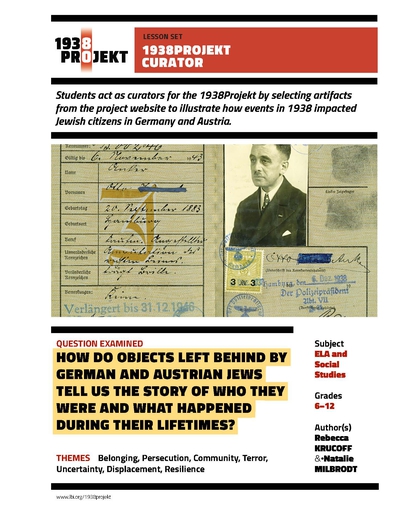
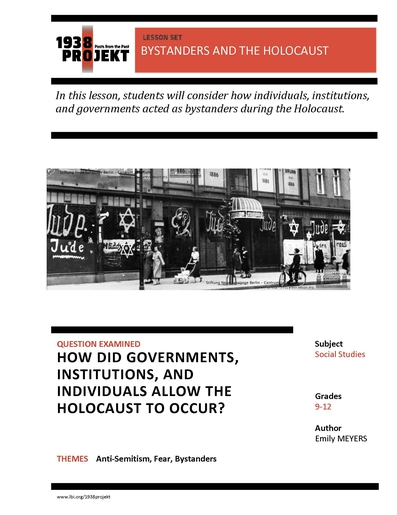
How did Governments, institutions, and individuals
allow the Holocaust to occur?
Grades: 9-12
Author: Emily Meyers
School: MS 223, the Academy of Finance and Technology, Bronx
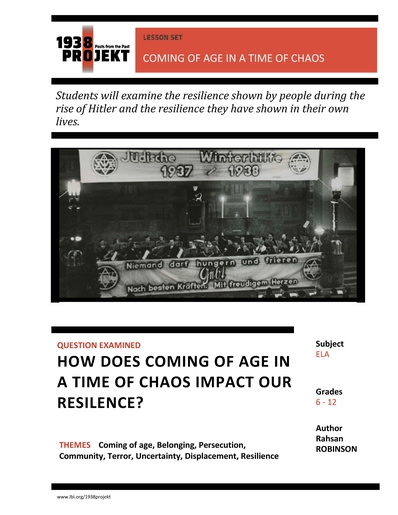
How does coming of age in a time of chaos impact our resilience?
Grades: 6-12
Author: Rahsan Robinson
School: Park Slope Collegiate, Brooklyn
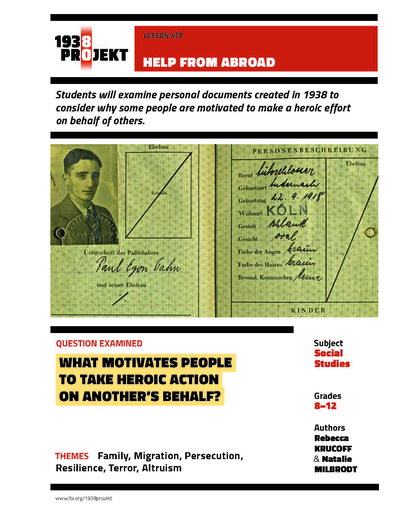
What motivates people to take heroic action on another's behalf?
Grades: 8-12
Authors: Rebecca Krucoff & Natalie Milbrodt, Educational Consultants
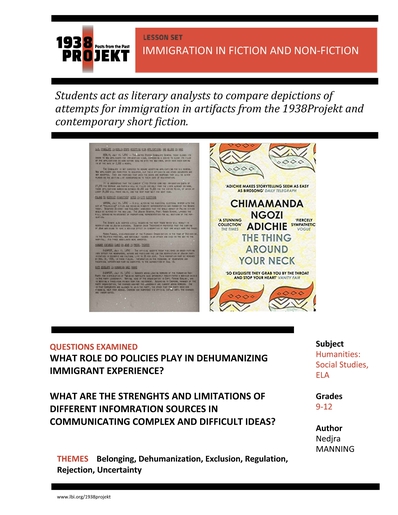
What role do policies play in dehumanizing immigrant experience?
Grades: 9-12
Author: Nedjra Vickie Manning
School: MS 223, the Academy of Finance and Technology, Bronx
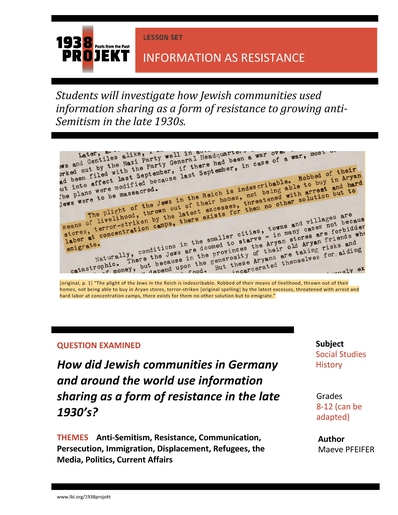
How did Jewish communities in Germany and around the world
use information sharing as a form of resistance in the late 1930's?
Grades: 8-12
Author: Maeve Pfeifer
School: School in the Square in Washington Heights, Manhattan
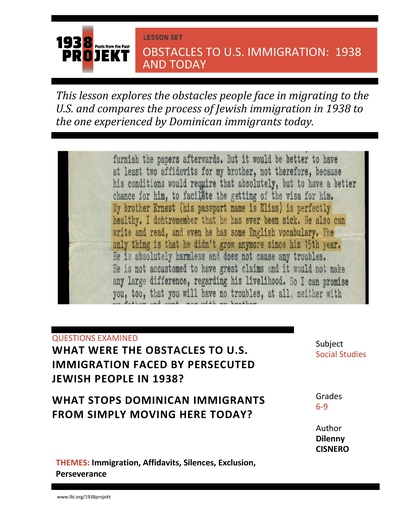
What were the obstacles to U.S. immigration
faced by persecuted Jewish people in 1938?
Grades: 6-9
Author: Dilenny Cisnero
School: MS 223, the Academy of Finance and Technology, Bronx
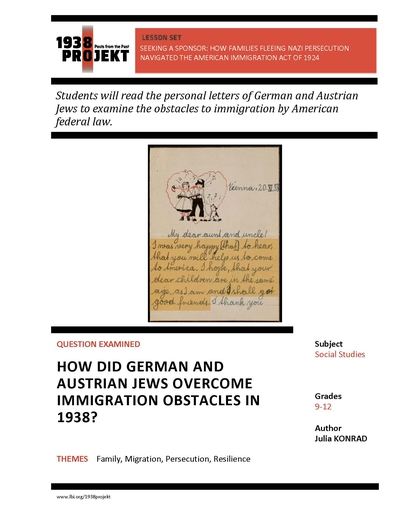
How did German and Austrian Jews overcome immigration obstacles in 1938?
Grades: 9-12
Author: Julia Konrad
School: Park Slope Collegiate, Brooklyn
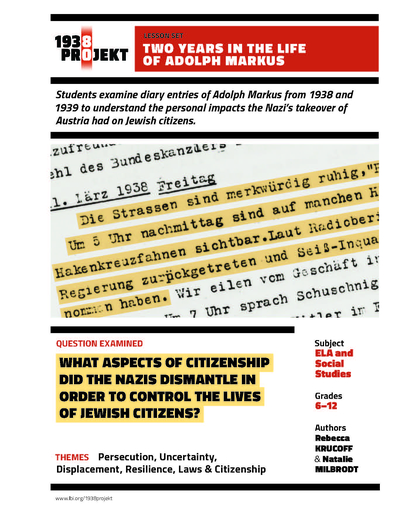
What aspects of citizenship did the Nazis dismantle
in order to control the lives of Jewish citizens?
Grades: 6-12
Authors: Rebecca Krucoff & Natalie Milbrodt, Educational Consultants
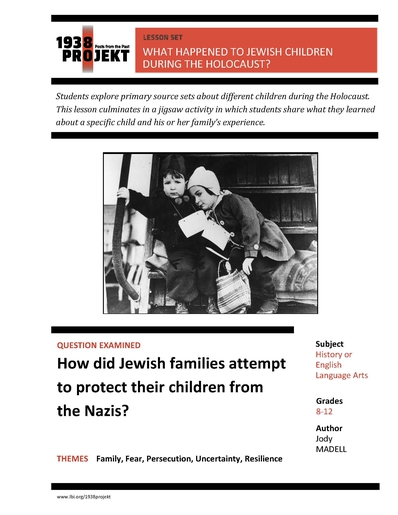
How did Jewish families attempt to protect their children from the Nazis?
Grades: 8-12
Author: Jody Madell
School: Lyons Community School, Brooklyn
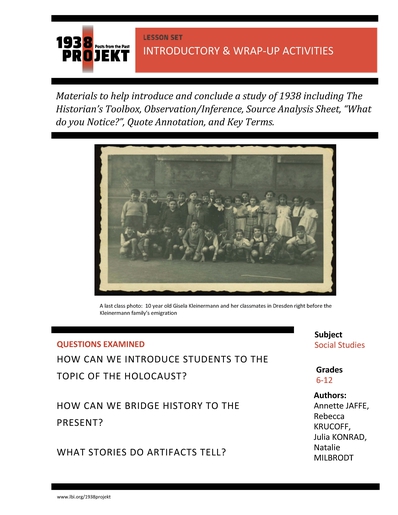
How can we introduce students to the topic of the Holocaust?
Grades: 6-12
Authors and affiliation: Annette Jaffe, I.S. 187, Brooklyn;
Julia Konrad, Park Slope Collegiate, Brooklyn;
Rebecca Krucoff & Natalie Milbrodt, Educational Consultants

A Project of the METRO New York Library Council & the Leo Baeck Institute
A group of New York's K-12 educators developed 11 ready-to-use lessons plans for Middle and High Schools based on LBI's 1938Projekt: Posts from the Past. The lesson plan project was sponsored by the METRO New York Library Council as part of their pilot project “User Engagement with Digital Collections.” All lesson plans are available for download (please click on individual lesson plan titles in the image carousel above, or access lesson plans through the 1938Projekt Pedagogical Resources webpage).
During two professional workshops in early 2020, educators from the New York City public school system explored LBI's online 1938Projekt under the guidance of educational consultants Rebecca Krucoff & Natalie Milbrodt, as well as Dr. Magdalena M. Wrobel, LBI’s Project Manager, and Renate Evers, LBI’s Director of Collections.
The goal of this project was to engage students in grades 6-12 with LBI’s online 1938Projekt: Posts from the Past as part of a broader mission to expand the use of digital archives and digital source material in schools. The project wanted to introduce teachers to specific educational methodologies that utilize digital archival material and digital settings. The project at the Leo Baeck Institute also aimed at maintaining the memory and importance of the Holocaust in the constantly changing world for both Jewish and non-Jewish students. As the time since WWII increases, more and more young people do no longer have direct contact with the generation who experienced anti-Semitism in Europe before WWII and survived the Holocaust. This reduces the Holocaust to a dramatic but far removed event in history for Jews, and even a lesser known episode in history for non-Jews.
By using the 1938Projekt as a foundation, teachers were able to visualize and contextualize archival material as an educational resource for historical content. The workshops helped teachers to navigate the 1938Projekt and to find and connect personal stories of victims to the broader topic of genocide. The lesson plans which were developed, introduce young students to using digital archival source material and historical research methodologies which will help them to better understand the past and to reflect on contemporary discourses and events. Teachers also explored LBI’s rich and comprehensive digital resources beyond the 1938Projekt as additional sources for educational purposes. And in turn, the Leo Baeck Institute learned how educators search, find, evaluate, and use original source material to teach K-12 students, a group that is not a traditional user group of the holdings of the Leo Baeck Institute. This will have a direct influence on how the institute will index and catalog new collections to make them better discoverable for educators. The main insight for the Leo Baeck Institute is that teachers and students needs to be able to find interesting, specific individual documents or objects more easily which are able to tell a story on their own, in addition to their embeddedness in their usually larger collection, family story, and in their historical context.
The fact that most of the documents in the collections of the Leo Baeck Institute are in German is a barrier to use the collections by non-German speakers. However, the teachers discovered that quite a number of documents which were used for the 1938 Projekt or in the LBI collections are actually in English, especially memoirs which were written by survivors for their families after the Holocaust, and also some of the correspondences between families who lived in different emigration countries, or between families who were trying to leave Germany or Austria and relatives or friends who were already in the United States. Documents which were used in the 1938Projekt which are in English or for which English translations exists, are specifically indexed. But most surprising for most educators was that some documents themselves tell a powerful story, even if the German language is not understood in all its details, e.g. passports, which were stamped with the letter "J" , or a poster that visualizes the different color labels which were used by the Nazis to differentiate visually between inmate groups in their vast prison and camp systems, and of course photos, drawings, forms and stamps, e.g. visa stamps, etc.
An observation from the activity report of the educators:
"A key takeaway was that navigating through multiple layers of a curated digital archives site, into online finding aids and then to individual artifacts, is too complicated for middle and high school students. We decided to start every lesson with the 1938Projekt website, but then offer a primary source set of selected artifacts, pulled specifically for each lesson. We will also develop a general purpose primary source set that will contain artifacts especially dense with details.
We also learned that when an archivist and an educator work together to prepare a lesson plan, the archivist’s knowledge of her collection content is extremely valuable. The time spent learning all the context for the artifacts she has processed does not need to be duplicated by the educator who is trying to find good examples to use in the lesson. It’s very helpful for the archivist to share highlights of the collections to inspire a concept for the lesson plan, and then for the educator to give the archivist a set of criteria needed for the individual artifacts or people who will be featured in the lesson plan. This back and forth is essential for time management and for being sure to include the strongest artifacts that tell the most meaningful stories from the collections."
Project Participants
Participating Educators and their Affiliations
Dilenny Cisnero, MS 223, the Academy of Finance and Technology, in the Bronx
Annette Jaffe, I.S. 187 in Brooklyn
Julia Konrad, Park Slope Collegiate in Brooklyn
Jody Madell, Lyons Community School in Brooklyn
Nedjra Vickie Manning, MS 223, the Academy of Finance and Technology, in the Bronx
Emily Meyers, MS 223, the Academy of Finance and Technology, in the Bronx
Maeve Pfeifer, School in the Square in Washington Heights, Manhattan
Rahsan Robinson, Park Slope Collegiate in Brooklyn
Educational Consultants
Rebecca Krucoff: A former social studies teacher and museum educator, Rebecca Krucoff is currently on faculty at Pratt Institute where she teaches courses in education, museum education, and public history. She holds an MS.Ed from Bank Street College and an MS Historic Preservation from Pratt Institute. Alongside her teaching and consultancy work, Rebecca is co-founder and director of Urban Memory Project, Inc., an education non-profit that encourages city residents to explore the vital relationship between their personal history and their city’s history.
Natalie Milbrodt: An archivist specializing in community archives, digital collections and oral history, Natalie Milbrodt currently leads the Queens Public Library's Metadata Services Division and Queens Memory Project, which she founded in 2010. She holds an MLIS and Certificate in Archives and Preservation of Cultural Materials from Queens College, CUNY. Milbrodt serves on the Oral History Association's Metadata Task Force and as an Advisory Board Member for New York State Historical Records, Global Grand Central and Wikitongues.
Graphic Design for Lesson Plans
Carl Edward Petrosyn, graphic design & art direction, Brooklyn
Leo Baeck Institute
Dr. Magdalena M. Wrobel, LBI Project Director and Curator of the 1938Projekt
Renate Evers, LBI Director of Collections
Chris Bentley, LBI Systems Archivist
Project Idea & Funding
METRO New York Library Council
Anne Karle-Zenith
Associate Director of Business Development
Project “User Engagement with Digital Collections.”